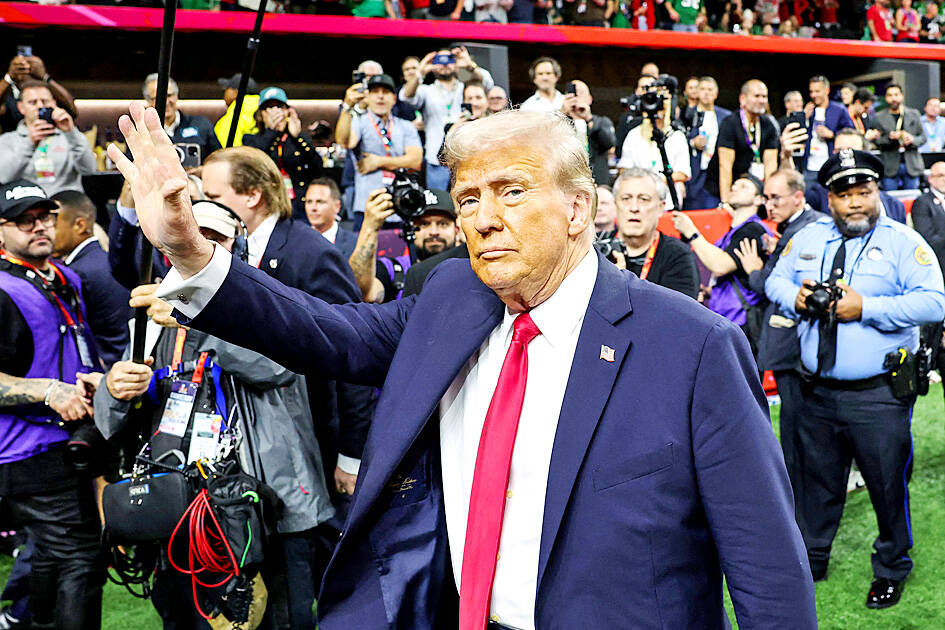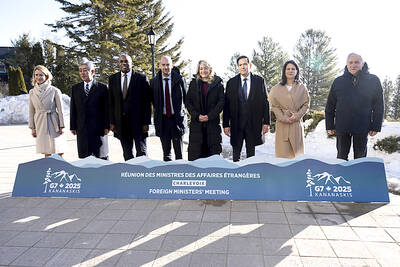US President Donald Trump on Sunday said that he would announce yesterday that the US would impose a 25 percent tariff on all steel and aluminum imports, including from Canada and Mexico, as well as other import duties later this week.
“Any steel coming into the United States is going to have a 25 percent tariff,” he told reporters on Air Force One as he flew from Florida to New Orleans to attend the Super Bowl.
When asked about aluminum, he responded, “aluminum, too” would be subject to the tariff.

Photo: Reuters
Trump also reaffirmed that he would announce “reciprocal tariffs” — “probably on Tuesday or Wednesday” — meaning that the US would impose import duties on products in cases where another nation has levied duties on US goods.
“If they are charging us 130 percent and we’re charging them nothing, it’s not going to stay that way,” he told reporters.
Trump’s comments are the latest example of his willingness to threaten, and in some cases to impose, import taxes. Tariffs are coming much earlier in his presidency than during his previous four years in the White House, when he prioritized tax cuts and deregulation.
Trump has alternately said he sees import taxes as tools to force concessions on issues such as immigration, but also as a source of revenue to help close the US government’s budget deficit.
Financial markets fell on Friday last week after Trump first said he would impose the reciprocal tariffs. Stock prices also dropped after a measure of consumer sentiment declined, largely because many respondents cited tariffs as a growing worry. The survey also found that Americans are expecting inflation to tick up in the coming months because of the duties.
Trump on Sunday did not offer any details about the steel and aluminum duties, or the reciprocal tariffs.
Trump previously threatened 25 percent import taxes on all goods from Canada and Mexico, although he paused them for 30 days barely a week ago. At the same time, he proceeded to add 10 percent duties on imports from China.
On Friday last week, he said he would also delay the tariffs on millions of small packages — often from fast-fashion firms such as PDD Holdings Inc’s (拼多多控股) Temu and Shein (希音) — until customs officials can figure out ways to impose them. The small packages have previously been exempt from tariffs.
Trump’s latest remarks stirred immediate concern from some global trading partners.
South Korean Acting President Choi Sang-mok yesterday called a meeting with the nation’s top foreign policy and trade officials to examine how Trump’s proposed tariffs on steel and aluminum would affect its industries.
Choi’s office said that officials discussed the potential impact and Seoul’s possible responses, but specific details of the meeting were not disclosed.
The stock prices of major South Korean steelmakers, including POSCO and Hyundai Steel, dropped when the stock market opened yesterday.
South Korea shipped about US$4.8 billion of steel to the US from January to November last year, which accounted for 14 percent of its global exports of the products during the period.

NATIONAL SECURITY: The Chinese influencer shared multiple videos on social media in which she claimed Taiwan is a part of China and supported its annexation Freedom of speech does not allow comments by Chinese residents in Taiwan that compromise national security or social stability, the nation’s top officials said yesterday, after the National Immigration Agency (NIA) revoked the residency permit of a Chinese influencer who published videos advocating China annexing Taiwan by force. Taiwan welcomes all foreigners to settle here and make families so long as they “love the land and people of Taiwan,” Premier Cho Jung-tai (卓榮泰) told lawmakers during a plenary session at the Legislative Yuan in Taipei. The public power of the government must be asserted when necessary and the Ministry of

Proposed amendments would forbid the use of all personal electronic devices during school hours in high schools and below, starting from the next school year in August, the Ministry of Education said on Monday. The Regulations on the Use of Mobile Devices at Educational Facilities up to High Schools (高級中等以下學校校園行動載具使用原則) state that mobile devices — defined as mobile phones, laptops, tablets, smartwatches or other wearables — should be turned off at school. The changes would stipulate that use of such devices during class is forbidden, and the devices should be handed to a teacher or the school for safekeeping. The amendments also say

EMBRACING TAIWAN: US lawmakers have introduced an act aiming to replace the use of ‘Chinese Taipei’ with ‘Taiwan’ across all Washington’s federal agencies A group of US House of Representatives lawmakers has introduced legislation to replace the term “Chinese Taipei” with “Taiwan” across all federal agencies. US Representative Byron Donalds announced the introduction of the “America supports Taiwan act,” which would mandate federal agencies adopt “Taiwan” in place of “Chinese Taipei,” a news release on his page on the US House of Representatives’ Web site said. US representatives Mike Collins, Barry Moore and Tom Tiffany are cosponsors of the legislation, US political newspaper The Hill reported yesterday. “The legislation is a push to normalize the position of Taiwan as an autonomous country, although the official US

CHANGE OF TONE: G7 foreign ministers dropped past reassurances that there is no change in the position of the G7 members on Taiwan, including ‘one China’ policies G7 foreign ministers on Friday took a tough stance on China, stepping up their language on Taiwan and omitting some conciliatory references from past statements, including to “one China” policies. A statement by ministers meeting in Canada mirrored last month’s Japan-US statement in condemning “coercion” toward Taiwan. Compared with a G7 foreign ministers’ statement in November last year, the statement added members’ concerns over China’s nuclear buildup, although it omitted references to their concerns about Beijing’s human rights abuses in Xinjiang, Tibet and Hong Kong. Also missing were references stressing the desire for “constructive and stable relations with China” and